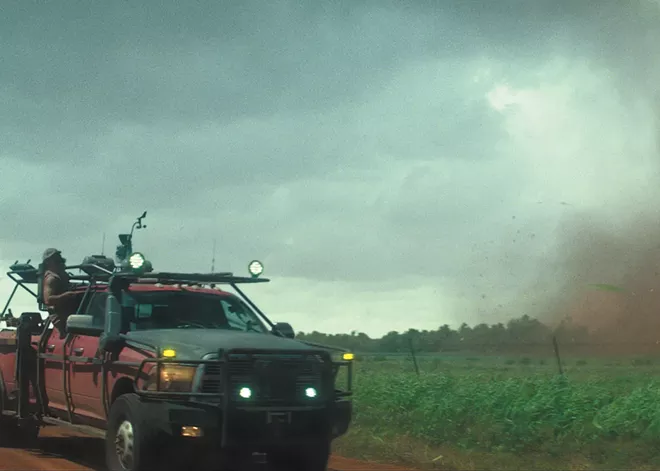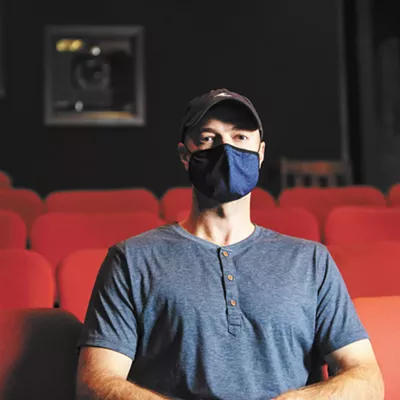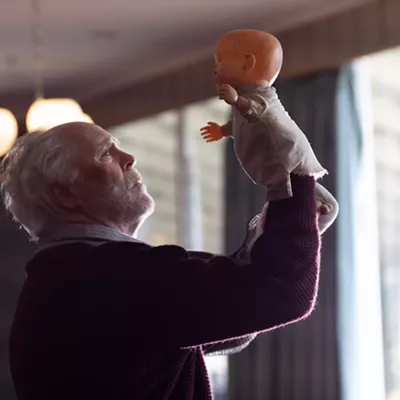It's strange to be nostalgic for a disaster film like Twister. Then again, these are strange times we're in.
When it first came out, the year was 1996, and the movie landscape as we know it was vastly different. Blockbusters were more often defined by original ideas. The hulking behemoth that is the Marvel Cinematic Universe was more than a decade away from kicking off with the redemptive story of an American weapons manufacturer discovering that he should make himself the weapon (2008's Iron Man).
Twister was a film that wasn't about setting up a sequel or a broader universe of superheroes. No, it was one about ordinary people trying to do what good they could. It stood on its own, taking its premise seriously while also remaining unafraid to be silly and play around with a great, if shallow, ensemble cast. It's humorous that it has now gotten a sequel in Twisters, which may as well have a dollar sign at the end to be Twister$. The original endures not just because of solid special effects and earned sincerity alongside spectacle. Its resonance comes from witnessing people come together to move the needle in a better direction away from disasters threatening to consume us all.
If only life itself were as simple as the movies we make.
Co-starring the late Bill Paxton alongside Helen Hunt (and co-written by the late Michael Crichton), Twister is a film that confronts the immense and destructive powers of nature by accompanying a ragtag group of storm-chasing scientists looking to fight against this annihilation. They're thrill-seekers, zipping around Tornado Alley in Oklahoma while blasting music to get hyped up for the adventure they're on, but they also hope to understand the enormous tornadoes that are tearing through the region so they can give people a few more minutes of warning to get out of their path.
Looking back, it almost seems quaint now. That the biggest human conflict is about Paxton's Bill butting heads with Cary Elwes' smarmy Dr. Jonas Miller, a corporate storm-chasing stooge who is in it for the money and the fame, is rather darkly funny in retrospect. One can only wish that the biggest thing we'd have to worry about with greedy corporations is that they would want to slap their name on something good as opposed to being the root of the problem.
In 2024, scientists warn extreme weather events are growing more common and will only continue to do so in the years ahead as temperatures continue to rise. It isn't just that disasters like tornadoes have grown more frequent, now coming in bursts and spreading beyond where they typically would years ago, but that we are continuing to toss aside the very people who they destroy.
In December 2021, eight workers at a Kentucky candle factory and six workers at an Illinois Amazon warehouse died. This happened because the survivors say their bosses refused to let them leave workplaces that were in the path of a powerful tornado. As I write this, Washington state is engulfed in a heatwave that is part of a nationwide crisis. There have already been fatalities and are likely to be more as, according to a UW report. More than 400 died from direct and indirect heat-related causes the last time around. And there is no Bill Paxton to stop this.
That the central plot of Twister is about rival storm-chasing groups trying to prove their early-warning technology first is comical but revealing. While this is all pretty silly, it feels painfully prescient as we look at what is rapidly becoming a terrifying new normal. Technology is often held up as the thing to save us from the extreme weather events bearing down on us. We continually think that if we can wrangle the weather we are making worse with some technological ingenuity and American can-do spirit, we'll be OK. It's a bill of goods that, while it makes for an entertaining movie, is nowhere near sufficient in real life.
Whether the premise of a movie or the guiding force behind policy, this technological delusion represents the height of humanity's hubris. To think we can tame the destructive forces of nature we have made infinitely worse is something that you see everywhere. If we can just find that one thing that will reverse the trends or do battle with nature, we'll be OK. In a narrative, it would be a MacGuffin. In life, it's a story that we tell ourselves to forestall that we should be taking a harder look at our consumption. As long as there is a charming character played by Paxton (or now Glen Powell in Twisters) to roll in with some spiffy technological invention, we can forget about what's necessitating their intervention in the first place.
So it's strange to be nostalgic for a film like Twister.
No matter how much it ultimately taps into the terror of extreme weather, the film's most enduring legacy is one of detachment. The final shot, where we see Paxton and Hunt share a smooch in the rubble of the aftermath of a storm, is fitting. It's an attempt at hope in a world where the storms now rage all the time. Alas, we're all going to need more than hope. Just like movies need original ideas, so too does our world. No matter how much we try to reheat what's already been done at the box office, life itself depends on greater imagination. ♦
Twisters opens in theaters on July 19.



























